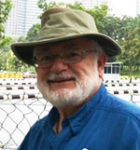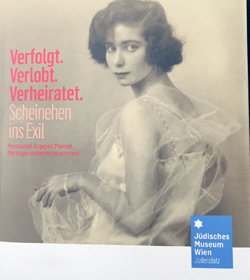Persecuted. Engaged. Married. Marriages of convenience in exile by Sabine Bergler and Irene Messinger, Jewish Museum Vienna, 2018, 147 pages.
By Oliver B. Pollak

 RICHMOND, California.– We marry for love, romance, money, and to procreate and extend family lineages. Marriages of convenience (MOC) are embedded in politics, survival, citizenship, and migration.
RICHMOND, California.– We marry for love, romance, money, and to procreate and extend family lineages. Marriages of convenience (MOC) are embedded in politics, survival, citizenship, and migration.
Marriage and Nazi domination evokes the horror of the 1935 Nuremberg laws which led to searching birth certificates to identify Jewish parents and their offspring, dispossession of employment and property, loss of citizenship, and worse. Jews were non-Aryans. “Mischling” children, the product of Jewish and Christian marriage were hustled out of Germany to save them and to secure the status of the now divorced Aryan father. Divorce among Jewish-Christian marriages became more common.
Austrian Jews suffered increased discrimination after Hitler came to power in 1933. Germany absorbed Austria in the Anschluss in March 1938. Austria became Ostmark and the takeover further worsened conditions for Jews. Marriage turned from a religious ritual to a civil ceremony. Civil marriages by magistrates replaced religious marriages on July 30, 1938. On Kristallnacht in November 1938 synagogues burned in Austria and Germany.
Jewish women found spouses through networks of family, friends, professional acquaintances, and the personal column in the Jewish newspaper, nine of which are reprinted. The five line personals appearing between 1938-41 with the first line in bold type read ‘Blonde; slim, pretty; Looking for my sister; Young elegant widow; and Respectable. They were artists, painters, musicians, dancers, scholars, medical student, heroically politically active women engaged in Socialist, Communist, and Zionist causes. The members of Vienna’s urban kibbutz were readying for Palestine. The best known was Erika Mann who through the agency of her gay brother arranged an MOC with the gay English writer W. H. Auden.
Marriages between Jewish women and foreign nationals who were gay, cousins, politically anti-fascist solidarity, and gold diggers, without intentions to cohabit, and to divorce when the political crisis had passed, marriages of convenience or sham marriages became more frequent. Most of the men were Jewish. These were marriages of survival to British, Czech, Dutch, Egyptian, French, and Italian men that provided a new passport and citizenship and a path out of Austria.
Irene Messenger is a Viennese political scientist who studies citizenship, exile and migration, the Austrian Alien Law of 2012, hot subjects today and in the 1930s. She identified at least one hundred Jewish Viennese women desperate to leave Austria. From this array the Jewish Museum Vienna selected thirteen, the tip of an iceberg, for extensive research. Her co-author, Sabine Berger, a student of comparative literature, art history, and Shoah literature, has been a researcher at Jewish Museum Vienna since 2014.
These women were courageous, intrepid and resourceful. They came from educated, assimilated bourgeois and upper class families. They did not live happily ever after. They carried the humiliation, of scrubbing the pavement, isolation, immigration permits that limited employment to domestic service as a housemaid, and in one case, moving to 25 lodgings in five years; life interrupted and disrupted.
Their Jewishness was problematic to them, but not to the Nazis. Their parents changed their name from Rosenblum to Rose in 1882. They converted to Catholicism and Protestantism in 1894 and 1901. Some “probably never set foot in a synagogue.” The authors suggest a process of deliberate secularization, the undeniable lure of German culture, Bach, Beethoven, Wagner. Departure from Judaism may have facilitated individual identification as an Austrian.”
In the main they were characterized as ‘assimilated Viennese Jewish bourgeois families.” They were described as “a Viennese girl of the Jewish religion, not as a Jew;” “Religion and traditions were almost absent from daily life;” she “knew that her family had Jewish origins, but religion did not play a role in her life, either then or later.”
Only much later did they and their families break their silence. Hilda Monte (1914-1945) married a gay Englishman. She was shot in Vorarlberg at the Swiss border while on a mission for the British. The violinist Alma Rose (1906-1944) went to Auschwitz in 1944, played in the women’s orchestra “and died under unexplained circumstances in August 1944.” Another related that “the entire Yugoslav branch [of the family] perished in the Shoah.” In Theresienstadt many died of neglect, malnutrition, and lack of resistance to normally non-fatal illnesses. Since they were incarcerated against their will, it is appropriate to say they were killed, murdered and executed. Others were more fortunate. One woman who moved to London lost her apartment in the blitz. Her resistance work remained unaffected, she still had her typewriter and a voice.
These fragmentary stories survive as one informant said, “Neither of my grandparents’ families had any descendants apart from me, my children. grandchildren, and great-grandchildren.”
The authors were gratified by coming into contact with numerous descendants and friends of these women. In spite of the bad experiences, the talk “of Austria was always full of love and longing,” and a “sentimental attachment to the city” of Vienna. These women “sound out the limits of human experience.” Austria engendered an enduring love, but the bureaucracy of reacquiring citizenship could take decades.
This is a compelling book and museum exhibit “of the fragility and interconnectedness of the three life segments – before, during, and after the marriage of convenience.” It reaches out to a wide audience by presenting a side by side German and English text. The Exhibit opened in May runs to October. Hopefully it will travel across the Atlantic for North American audiences.
*
Pollak, a professor emeritus of history at the University of Nebraska Omaha, and a lawyer, is a freelance writer now based in Richmond, California. He may be contacted via oliver.pollak@sdjewishworld.com